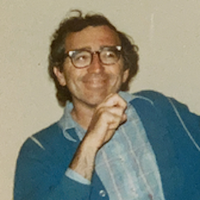
Born in Brooklyn, Paul Goodman was a pioneer in the “new political history” of the 1960s and 1970s. An acclaimed scholar of the early U.S. republic, he was a beloved graduate mentor, engaging undergraduate instructor, and generous donor to the History Department and the Davis campus.
Goodman was a student of famed historian Oscar Handlin of Harvard University, where Goodman received his Ph.D. in 1961. After short stints teaching at the Harvard Business School and Brooklyn College, he came to UC Davis in the mid-1960s. Paul’s first book, The Democratic-Republicans of Massachusetts: Politics in a Young Republic (Harvard, 1965), used statistical analysis of voters to create socioeconomic political profiles. He examined divergent political strands in the politics of anti-masonry in his second book, Towards a Christian Republic: Antimasonry and the Great Transition in New England, 1826-1836 (Oxford, 1988). He also (with F.O. Gatell) published a textbook, USA, An American Record (Holt, Rinehart and Winston, 1971). His final book, Of One Blood: Origins of Racial Equality and the Rise of Abolitionism, 1820-1840 (California, 1998), was something of a departure. Goodman was steeped in the abolitionist sources, and discerned a thread of commitment to racial equality that had not received much attention.
Goodman was a quietly cosmopolitan scholar with a deep commitment to social justice. He anonymously funded the Eugene V. Debs scholarship for graduate students every year, and the bulk of his estate established the endowed Emmanual Ringelblum Chair in Jewish history. Ringelblum was a martyred historian and hero of the Warsaw ghetto. Goodman also developed an undergraduate course on Holocaust Studies, a labor of love that reflected his passionate commitment to a morally informed understanding of the past.
He was a demanding yet engaging teacher. He would bring a mandolin to his U.S. survey class for a lecture on nativism and sing a rendition of “No Irish Need Apply”; in his Holocaust history course, he sang Yiddish songs of the camps and liberation. Along with Roland Marchand, he created a huge slide file of historical images for use in teaching. For years, he taught the graduate seminar in colonial and antebellum history, and mentored many top grad students, at Davis and Berkeley, over parts of four decades. He was a voracious reader of the current literature, and loved to hear grad students mix it up over historiographical pretensions and minutiae.
Goodman was a lovely conversationalist with many and wide-ranging interests, including gardening and cooking. He was always interested in people’s lives, as befitting a historian. He once told his graduate students there were two kinds of historians: The research historians, and those who write the works of synthesis. He taught his students how to be both.
He died in 1995, at age 61, of cancer.